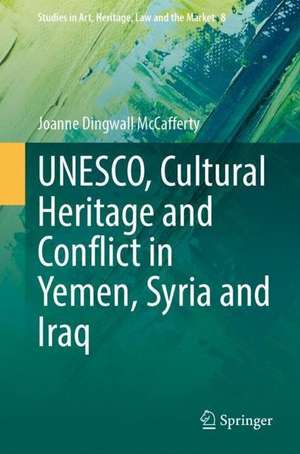UNESCO, Cultural Heritage and Conflict in Yemen, Syria and Iraq: Studies in Art, Heritage, Law and the Market, cartea 8
Autor Joanne Dingwall McCaffertyen Limba Engleză Hardback – 19 feb 2023
Both quantitative and qualitative data shows UNESCO to exhibit great inequity in engagement, at times, closing communications entirely with Syria, due to the political standpoints of other UNESCO Member States. This politicalgridlock is often shown to result in the organisation overstating its ability to safeguard or restore heritage, with promises not being followed up with action.
Since 2015, UNESCO has expressed a stronger intent to be a key player in heritage protection during armed conflict, however as long as cultural heritage protection is not considered a humanitarian concern, UNESCO will not be able to circumvent much of the political and bureaucratic barriers facing intergovernmental organisations during conflict, which prevent emergency action from being implemented. In order to ensure heritage safeguarding is permitted during periods of significant unrest, regardless of political discord, it is crucial that UNESCO promote a people-centred approach to its cultural heritage protection initiatives. This book evidences that focusing on livelihoods and meaningful and practical connections between populations and their local heritage to be UNESCO's optimal methodological approach forjustifying cultural heritage protection as a humanitarian necessity.
The book's readership includes academics, researchers, and practitioners in the fields of political science, law and heritage studies.
| Toate formatele și edițiile | Preț | Express |
|---|---|---|
| Paperback (1) | 732.31 lei 38-44 zile | |
| Springer International Publishing – 20 feb 2024 | 732.31 lei 38-44 zile | |
| Hardback (1) | 895.76 lei 6-8 săpt. | |
| Springer International Publishing – 19 feb 2023 | 895.76 lei 6-8 săpt. |
Preț: 895.76 lei
Preț vechi: 1092.39 lei
-18% Nou
Puncte Express: 1344
Preț estimativ în valută:
171.40€ • 179.44$ • 141.82£
171.40€ • 179.44$ • 141.82£
Carte tipărită la comandă
Livrare economică 07-21 aprilie
Preluare comenzi: 021 569.72.76
Specificații
ISBN-13: 9783031196744
ISBN-10: 3031196740
Pagini: 269
Ilustrații: XV, 269 p. 1 illus.
Dimensiuni: 155 x 235 mm
Greutate: 0.58 kg
Ediția:1st ed. 2023
Editura: Springer International Publishing
Colecția Springer
Seria Studies in Art, Heritage, Law and the Market
Locul publicării:Cham, Switzerland
ISBN-10: 3031196740
Pagini: 269
Ilustrații: XV, 269 p. 1 illus.
Dimensiuni: 155 x 235 mm
Greutate: 0.58 kg
Ediția:1st ed. 2023
Editura: Springer International Publishing
Colecția Springer
Seria Studies in Art, Heritage, Law and the Market
Locul publicării:Cham, Switzerland
Cuprins
Chapter 1: Where Conflict and Culture Connect.- Chapter 2: UNESCO’s Legal Obligation and Capability to Protect Cultural Heritage during Armed Conflict .- Chapter 3: The State Heritage Institutions of Yemen, Syria and Iraq.- Chapter 4: The Impact of Conflict on UNESCO’s Engagement with Yemen, Syria and Iraq.- Chapter 5: UNESCO’s Emergency Response “First-Aid” to Cultural Heritage Sites.- Chapter 6: UNESCO’s Reconstruction of Cultural Heritage Sites.- Chapter 7: Conclusions.- References.- Appendices.
Notă biografică
Joanne Dingwall McCafferty is an Affiliate with the University of Copenhagen, where between February 2019 and January 2022, she was a PhD Fellow researching the role of UNESCO in the protection of cultural heritage during armed conflict in Yemen, Syria and Iraq, and also held the position of Research Assistant. Joanne has worked with the Smithsonian Provenance Research Initiative in Washington DC, designed and delivered various courses and workshops on Heritage Protection in Urban Conflicts and has assumed the role of academic advisor at meetings with NATO HQ, the Romanian National Commission for UNESCO, and various UNESCO Delegations.
Textul de pe ultima copertă
This book aims to determine UNESCO's capability to facilitate heritage protection measures pre-conflict, emergency response measures during conflict and reconstruction efforts post-conflict. The book employs document analysis to ascertain UNESCO's legal obligations when it comes to facilitating cultural heritage protection in its Member States' territories in the condition of armed conflict, while drawing comparisons with the reality of the organisation's presence and involvement in Yemen, Syria and Iraq. This study maps shifts in UNESCO's level of communication with each country's respective government and civil authorities; allocation of financial, human and material resources; and implementation of heritage safeguarding and reconstruction initiatives.
Both quantitative and qualitative data shows UNESCO to exhibit great inequity in engagement, at times, closing communications entirely with Syria, due to the political standpoints of other UNESCO Member States. This politicalgridlock is often shown to result in the organisation overstating its ability to safeguard or restore heritage, with promises not being followed up with action.
Since 2015, UNESCO has expressed a stronger intent to be a key player in heritage protection during armed conflict, however as long as cultural heritage protection is not considered a humanitarian concern, UNESCO will not be able to circumvent much of the political and bureaucratic barriers facing intergovernmental organisations during conflict, which prevent emergency action from being implemented. In order to ensure heritage safeguarding is permitted during periods of significant unrest, regardless of political discord, it is crucial that UNESCO promote a people-centred approach to its cultural heritage protection initiatives. This book evidences that focusing on livelihoods and meaningful and practical connections between populations and their local heritage to be UNESCO's optimal methodological approach forjustifying cultural heritage protection as a humanitarian necessity.
The book's readership includes academics, researchers, and practitioners in the fields of political science, law and heritage studies.
Caracteristici
Provides a comprehensive legal analysis of UNESCO's responsibility to protect heritage during conflict Includes comparative case study of changes in UNESCO’s engagement in Yemen, Syria and Iraq Discusses UNESCO’s political and financial limitations when it comes to heritage protection









